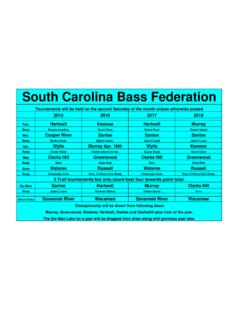Transcription of THE SUPREME COURT OF APPEAL OF SOUTH …
1 THE SUPREME COURT OF APPEAL OF SOUTH AFRICA JUDGMENT Not reportable Case No: 542/2016 In the matter between: afgri operations limited appellant and HAMBA FLEET (PTY) limited RESPONDENT Neutral citation: afgri operations Ltd v Hamba Fleet Management (Pty) Ltd (542/16) [2017] ZASCA 24 (24 March 2017) Coram: Leach, Theron, Petse, Willis and Dambuza JJA Heard: 10 March 2017 Delivered: 24 March 2017 Summary: Company law : application for a final order of liquidation : underlying debt admitted by the respondent : no allegation that respondent solvent : respondent not trading or conducting any business : respondent s indebtedness prima facie established : onus on respondent to show that indebtedness disputed on bona fide and reasonable grounds : a counterclaim not in itself a reason for refusing an order for the winding up of the respondent.
2 Final order winding-up the respondent granted. 2 ORDER On APPEAL from: The Gauteng Division, Pretoria (Mabuse J sitting as the COURT of first instance). (a) The APPEAL is upheld. (b) The order of the High COURT is set aside and replaced with the following: The respondent is placed under a final winding-up order in the hands of the Master. (c) The appellant s costs in the APPEAL and in the application before the High COURT are to be costs in the liquidation of the respondent. JUDGMENT _____ Willis JA (Leach, Theron, Petse and Dambuza JJA concurring): [1] The appellant , the applicant in the COURT a quo, applied for a final order of liquidation of the respondent.
3 That COURT (Mabuse J) dismissed the application with costs but granted leave to APPEAL to this COURT . [2] The appellant had obtained a judgment for costs against the respondent on 4 February 2014. These costs were, by agreement between consultants employed by the parties, taxed in an amount of R156 The respondent failed to discharge this debt owed to the appellant . The appellant then brought an application to wind up the respondent on the basis that the respondent was unable to pay its debts within the meaning of s 345(1)(a), read with s 344(f) of the Companies Act 61 of 1973 (the old Companies Act).
4 Other than to present a bald denial that it is insolvent, the respondent did not dispute the underlying debt and that it had failed to pay it. In addition, the issues of whether demand had been given by the appellant to the 3 respondent in terms of s 345 of the old Companies Act and the failure of the respondent to satisfy that demand, were not in dispute. [3] The COURT a quo dismissed the application for the winding-up of the respondent solely on the basis that it had a counterclaim against the appellant .
5 The counterclaim arises from allegedly unlawful transfers in an amount in excess of R22 million that the appellant had made from the respondent s bank account during the period 12 November 2003 to 22 March 2006. These transfers were alleged to have taken place while the appellant had been managing the affairs of the respondent in terms of a Management Agreement . The summons in respect of this claim had been issued on 10 March 2009 but had not been pursued by the respondent. Not only is the claim illiquid but also the summons was not even attached to the respondent s answering affidavit.
6 [4] The respondent made no allegation that it was either factually or commercially solvent. It is common cause that the respondent was not trading or conducting any business at the time of the application for its winding-up. The respondent also admits that it has no assets but places the blame for this on the appellant . Most significantly, as previously mentioned, the underlying debt, giving rise to the application for the winding-up of the respondent, was not in dispute. Indeed, it was admitted by the respondent.
7 [5] In dismissing the application for the winding-up of the respondent, the COURT a quo relied upon the exercise of its discretion. In its judgment it said: To conclude on this point I accept that in SOUTH African law, as in English law, the power of the COURT to grant a winding-up order is discretionary, irrespective of the grounds on which such order is sought. A little later on, it said: Quite clearly the applicant has a number of concerns against the respondent s action. I have noted those concerns but under the circumstances this COURT is not at liberty to deal with them or the respondent s claims at this stage and in this proceedings.
8 (Emphasis added.) The questions that therefore arise in this APPEAL are: (a) may this COURT interfere with the exercise of its discretion and, if so (b) should it do so? 4 [6] It is trite that winding-up proceedings are not to be used to enforce payment of a debt that is disputed on bona fide and reasonable This is known as the so-called Badenhorst rule .2 Where, however, the respondent s indebtedness has, prima facie, been established, the onus is on it to show that this indebtedness is indeed disputed on bona fide and reasonable [7]
9 The existence of a counterclaim which, if established, would result in a discharge by set-off of an applicant s claim for a liquidation order is not, in itself, a reason for refusing to grant an order for the winding-up of the respondent but it may, however, be a factor to be taken into account in exercising the COURT s discretion as to whether to grant the order or [8] The COURT a quo was much influenced by a series of English cases in which it has been held that a genuine cross-claim, the equivalent of our counterclaim, is a matter which may justify the exercise of a discretion against making a winding-up order.
10 It relied, in particular, on Re: Portman Provincial Cinemas Ltd5 and Re: Bay Oil Seawind Tankers Corp v Bay Oil SA6 and the authorities therein cited. The difficulty is, of course, encapsulated in Plascon-Evans Paints Ltd v Van Riebeeck Paints (Pty) Ltd,7 with which every lawyer must be familiar: how does one decide 1 See Badenhorst v Northern Construction Enterprises (Pty) Ltd 1956 (2) SA 346 (T) at 347-348 and Kalil v Decotex (Pty) Ltd & another 1988 (1) SA 943 (A) at 980D.
















